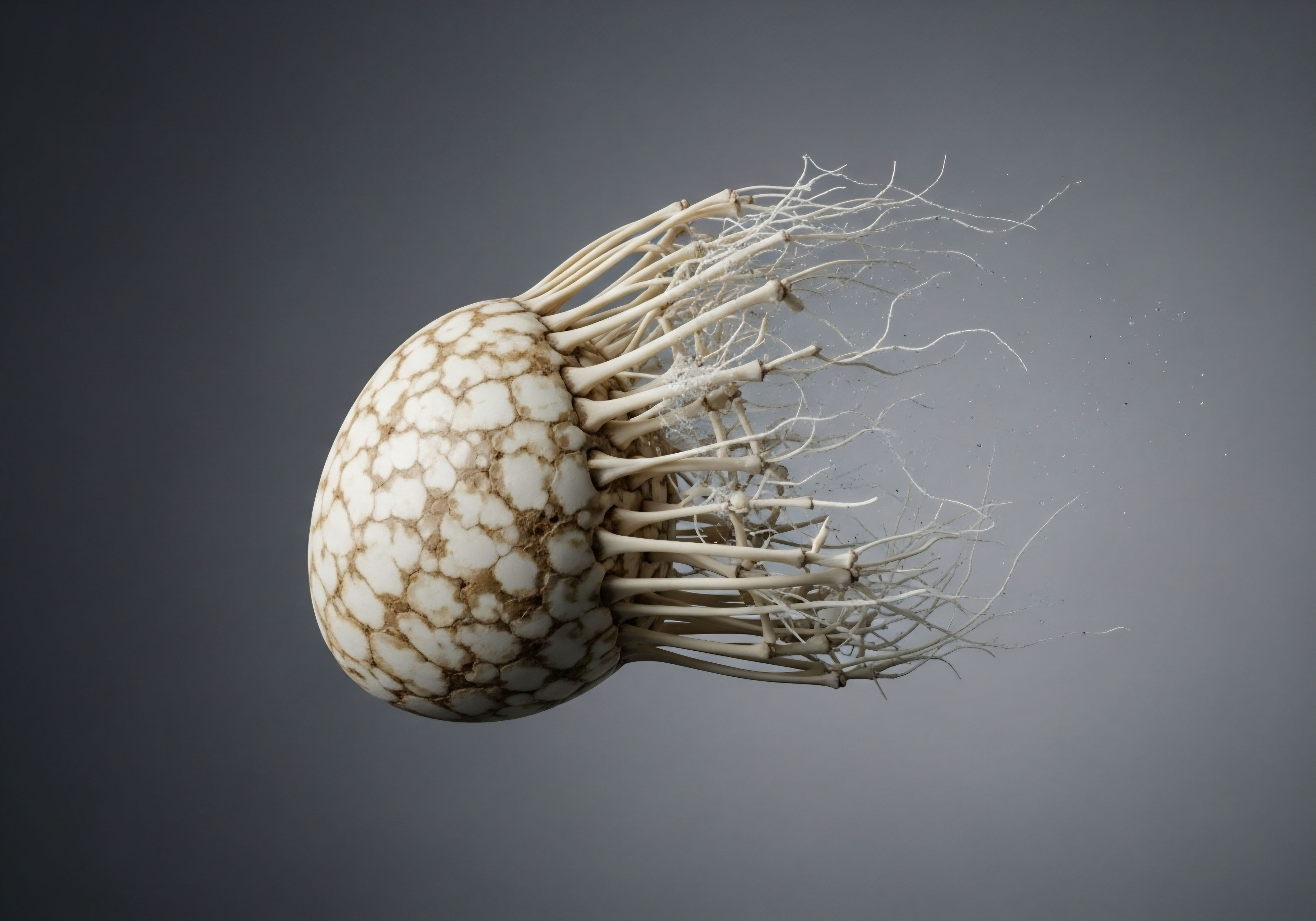

Fundamentals
When the vibrancy that once defined your days begins to fade, replaced by a persistent weariness, diminished drive, or a subtle shift in your physical and mental landscape, it can feel disorienting. You might recognize these sensations as a quiet erosion of your vitality, a sense that your body’s internal rhythm has become discordant.
For many, this experience aligns with shifts in hormonal balance, particularly declining testosterone levels. Testosterone replacement therapy, or TRT, offers a path to recalibrating these systems, yet it represents only one part of a comprehensive strategy.
Consider the body not as a collection of isolated components, but as an intricate, interconnected system, much like a complex clockwork mechanism. Each gear and spring must function optimally for the whole to keep precise time. Similarly, while exogenous testosterone can restore a crucial hormonal signal, its effectiveness is profoundly influenced by the foundational elements that support every cellular process.
These foundational elements are the micronutrients ∞ the vitamins and minerals required in smaller quantities, yet indispensable for orchestrating biochemical reactions throughout your physiology.
Reclaiming vitality involves understanding how foundational micronutrients support the body’s intricate hormonal systems, complementing targeted therapies like testosterone replacement.
Micronutrients act as the essential cofactors and catalysts for countless enzymatic reactions, including those directly involved in hormone production, metabolism, and cellular signaling. Without adequate levels of these vital compounds, even the most precisely administered hormonal optimization protocols may encounter limitations. The body’s ability to synthesize, transport, and utilize hormones, as well as manage their downstream effects, relies heavily on a robust micronutrient status.

The Body’s Internal Messaging System
Hormones serve as the body’s internal messaging service, transmitting instructions across various tissues and organs. Testosterone, for instance, influences muscle protein synthesis, bone density, red blood cell production, and neurocognitive function. For these messages to be received and acted upon effectively, the cellular machinery must be well-equipped.
Micronutrients contribute to the structural integrity of cells, the efficiency of energy production, and the detoxification pathways that process hormonal byproducts. A deficiency in even one key micronutrient can create a bottleneck, impeding the smooth operation of these critical biological processes.
Supporting your endocrine system, therefore, extends beyond simply replacing a missing hormone. It involves providing the complete spectrum of nutritional building blocks and regulatory agents that allow your body to function with optimal efficiency. This holistic perspective acknowledges that true wellness arises from a harmonious interplay of all biological systems, each supported by the fundamental nutritional components it requires.


Intermediate
Understanding the role of micronutrients in optimizing hormonal optimization protocols requires a closer look at their specific contributions to the endocrine system. Testosterone replacement therapy, whether for men addressing symptoms of low testosterone or women seeking hormonal balance, aims to restore physiological levels of this vital androgen.
However, the efficacy of this biochemical recalibration is significantly enhanced when the body possesses the necessary micronutrient cofactors. These elements participate directly in the synthesis, regulation, and metabolism of testosterone and other related hormones.

How Do Micronutrients Influence Testosterone Synthesis?
Several micronutrients are directly implicated in the intricate biochemical pathways that lead to testosterone production. Their presence ensures that the enzymatic reactions proceed efficiently, supporting the body’s capacity to respond to exogenous testosterone or to maintain endogenous production when stimulated by agents like Gonadorelin.
- Zinc ∞ This essential mineral plays a direct role in testosterone synthesis within the Leydig cells of the testes. Restricting dietary zinc intake can lead to a significant decrease in testosterone levels. Conversely, zinc supplementation in individuals with a deficiency has been shown to increase testosterone concentrations. Zinc also acts as an inhibitor of aromatase, an enzyme that converts testosterone into estrogen, thereby helping to maintain a favorable androgen-to-estrogen ratio.
- Vitamin D ∞ Often referred to as a steroid hormone itself, Vitamin D is crucial for overall health and directly influences testosterone production. Men with adequate vitamin D levels typically exhibit higher testosterone concentrations compared to those with a deficiency. Studies indicate that vitamin D supplementation can lead to a significant increase in total and free testosterone levels. Vitamin D receptors are present in testicular tissues, underscoring its direct involvement in the production of this hormone.
- Magnesium ∞ This mineral is vital for over 300 enzymatic reactions, including those related to testosterone production and energy metabolism. Magnesium supplementation can increase testosterone levels in both sedentary and physically active individuals. It supports muscle function and overall health, contributing to improved physical performance, which can indirectly support hormonal balance.
Beyond direct synthesis, micronutrients are also critical for managing the delicate balance of other hormones and metabolic processes that interact with testosterone. For instance, in men undergoing TRT, Gonadorelin is often prescribed to maintain natural testosterone production and fertility by stimulating the pituitary gland to release luteinizing hormone (LH) and follicle-stimulating hormone (FSH).
Anastrozole, an aromatase inhibitor, is used to block the conversion of testosterone to estrogen, preventing potential side effects. Micronutrients support the body’s response to these medications and help mitigate their metabolic impacts.
Specific micronutrients like zinc, vitamin D, and magnesium are indispensable cofactors for testosterone synthesis and hormonal regulation, directly influencing the effectiveness of TRT.

Supporting Estrogen Metabolism and Thyroid Function
Maintaining optimal testosterone levels is not solely about production; it also involves efficient metabolism of other hormones, particularly estrogen. While estrogen is essential for various physiological functions in both sexes, excessive levels in men on TRT can lead to undesirable effects.
- B Vitamins ∞ Methylated B vitamins, including methylcobalamin (B12), methylfolate (B9), and pyridoxal-5-phosphate (B6), are critical for methylation pathways. These pathways are essential for detoxifying and clearing harmful estrogen and testosterone metabolites, thereby promoting better hormonal health and potentially reducing risks associated with hormonal imbalances. Vitamin B6 also plays a role in testicular function and has antioxidant properties that protect sperm.
- Selenium ∞ This trace mineral supports overall hormonal health, including crucial thyroid function, which indirectly influences testosterone levels. The thyroid gland produces hormones that regulate metabolism, growth, and development. Selenium is a component of enzymes involved in thyroid hormone metabolism and provides antioxidant protection to the thyroid, which is susceptible to oxidative stress. Adequate selenium levels are necessary for the conversion of inactive thyroid hormone (T4) to its active form (T3), a process that impacts overall metabolic rate and hormonal signaling.
- Vitamin K2 ∞ While not directly involved in testosterone synthesis, Vitamin K2 works synergistically with Vitamin D3 to promote bone health and improve cardiovascular health. It activates proteins that prevent calcium from depositing in arteries, reducing the risk of cardiovascular diseases. This is particularly relevant for individuals on TRT, as maintaining cardiovascular wellness is paramount for long-term health and longevity.
The table below summarizes some key micronutrients and their roles in supporting hormonal health and TRT outcomes:
| Micronutrient | Primary Role in Hormonal Health | Impact on TRT Outcomes |
|---|---|---|
| Zinc | Testosterone synthesis, aromatase inhibition | Supports endogenous production, manages estrogen conversion |
| Vitamin D | Directly influences testosterone production, receptor function | Enhances total and free testosterone levels |
| Magnesium | Enzymatic reactions for testosterone, muscle function | Increases testosterone bioavailability, supports physical performance |
| Methylated B Vitamins | Estrogen metabolism, detoxification, methylation | Clears harmful metabolites, supports overall hormonal balance |
| Selenium | Thyroid hormone metabolism, antioxidant defense | Indirectly influences testosterone, protects endocrine glands |
| Vitamin K2 | Calcium homeostasis, cardiovascular health | Supports bone and heart health, crucial for long-term wellness on TRT |
The strategic inclusion of these micronutrients, whether through dietary choices or targeted supplementation, creates a more resilient and responsive physiological environment. This comprehensive approach ensures that the body is not merely receiving a hormonal signal, but is fully equipped to process, utilize, and benefit from it, leading to more robust and sustained wellness outcomes.


Academic
The deep exploration of micronutrients in the context of hormonal optimization protocols necessitates a systems-biology perspective, moving beyond isolated effects to consider the intricate interplay of biological axes, metabolic pathways, and cellular mechanisms. Testosterone replacement therapy, while directly addressing androgen deficiency, operates within a complex endocrine network where micronutrient status can significantly modulate therapeutic efficacy and long-term health trajectories.

The Hypothalamic-Pituitary-Gonadal Axis and Micronutrient Modulation
The Hypothalamic-Pituitary-Gonadal (HPG) axis represents the central regulatory system for testosterone production. The hypothalamus releases Gonadotropin-Releasing Hormone (GnRH) in a pulsatile manner, signaling the pituitary gland to secrete Luteinizing Hormone (LH) and Follicle-Stimulating Hormone (FSH). LH then stimulates the Leydig cells in the testes to synthesize testosterone.
Micronutrients exert influence at multiple points within this axis. For example, zinc is a critical cofactor for GnRH synthesis and release, and its deficiency can impair the entire cascade. Similarly, vitamin D receptors are present in the hypothalamus, pituitary, and testes, suggesting a direct modulatory role on the HPG axis, influencing both central regulation and peripheral production of testosterone.
Micronutrients exert profound influence on the HPG axis, modulating testosterone synthesis and overall endocrine system function at multiple regulatory points.
When exogenous testosterone is introduced, the HPG axis typically downregulates endogenous production through negative feedback. However, in protocols that aim to preserve fertility, such as those incorporating Gonadorelin, micronutrient support becomes even more critical. Gonadorelin, being bioidentical to natural GnRH, stimulates the pituitary to release LH and FSH, thereby maintaining testicular function.
The efficiency of this stimulation and the subsequent testicular response can be enhanced by adequate levels of zinc and selenium, which are essential for spermatogenesis and Leydig cell integrity.

Metabolic Interplay and Estrogen Homeostasis
Hormonal health is inextricably linked with metabolic function. Testosterone and estrogen are potent metabolic regulators in both sexes. When their production declines, metabolic dysfunction can arise, promoting degenerative metabolic and vascular conditions. Micronutrients play a crucial role in maintaining metabolic equilibrium and managing estrogen homeostasis, particularly important when administering exogenous testosterone.
The conversion of testosterone to estrogen via the aromatase enzyme is a key metabolic pathway. While some estrogen is essential for bone and cardiovascular health in men, excessive conversion can lead to adverse effects. Micronutrients like zinc can inhibit aromatase activity, helping to balance this conversion.
Furthermore, the body’s ability to detoxify and excrete estrogen metabolites relies heavily on methylation pathways, which are dependent on methylated B vitamins. A robust methylation capacity, supported by adequate intake of methylfolate, methylcobalamin, and pyridoxal-5-phosphate, ensures efficient clearance of estrogenic compounds, reducing the burden on the system and mitigating potential side effects of TRT.
Consider the intricate dance between testosterone, estrogen, and metabolic markers. The following table illustrates how specific micronutrients contribute to this complex interplay:
| Micronutrient | Molecular Mechanism | Physiological Impact on TRT |
|---|---|---|
| Zinc | Cofactor for steroidogenic enzymes; aromatase inhibitor | Supports Leydig cell function; modulates testosterone-to-estrogen conversion |
| Vitamin D | Acts as a steroid hormone; modulates gene expression in testicular cells | Directly influences testosterone synthesis; impacts receptor sensitivity |
| Magnesium | Cofactor for ATP production; influences free testosterone binding | Enhances energy metabolism; increases bioavailable testosterone |
| Methylated B Vitamins | Supports methylation cycle (e.g. MTHFR enzyme activity) | Facilitates estrogen detoxification; reduces homocysteine levels |
| Selenium | Component of selenoproteins (e.g. glutathione peroxidase); thyroid hormone deiodinases | Antioxidant protection for testes; optimizes thyroid-mediated metabolism |
| Vitamin K2 | Activates Matrix Gla Protein (MGP); directs calcium | Prevents vascular calcification; supports cardiovascular integrity |
The integration of micronutrient support into hormonal optimization protocols represents a sophisticated approach to patient well-being. It acknowledges that the body’s systems are deeply interconnected, and that true restoration of vitality requires addressing the fundamental nutritional requirements that underpin all physiological processes. This comprehensive strategy moves beyond symptomatic relief, aiming for a deeper recalibration of biological function.

Can Micronutrient Deficiencies Compromise TRT Efficacy?
Micronutrient deficiencies can indeed compromise the efficacy of testosterone replacement therapy. If the body lacks the necessary cofactors for hormone synthesis, receptor sensitivity, or metabolic clearance, the exogenous testosterone may not be fully utilized or may lead to imbalances. For example, inadequate magnesium can limit the amount of free testosterone available, even if total testosterone levels are within range.
Similarly, compromised methylation due to B vitamin deficiencies can hinder the proper processing of estrogen, potentially leading to symptoms of estrogen dominance despite appropriate Anastrozole dosing.
The interplay between micronutrients and peptide therapy also warrants consideration. Peptides, being short chains of amino acids, rely on a robust nutritional foundation for their synthesis, function, and signaling. For instance, growth hormone-releasing peptides like Sermorelin or Ipamorelin/CJC-1295 stimulate the body’s natural growth hormone production.
The amino acid building blocks for these peptides, and the cellular machinery they activate, are supported by a diet rich in proteins, vitamins, and minerals. Micronutrients contribute to the overall cellular health and metabolic efficiency that allows peptide therapies to exert their intended effects, whether for muscle gain, fat loss, or tissue repair.

References
- Wrzosek, M. Włodarek, D. & Woźniak, J. The effect of zinc, magnesium and vitamin D on testosterone synthesis in men. Polish Journal of Sports Medicine, 2018; 34(3) ∞ 123-134.
- Ventura, M. Melo, M. & Carrilho, F. Selenium and Thyroid Disease ∞ From Pathophysiology to Treatment. International Journal of Endocrinology, 2017; 2017 ∞ 1297658.
- Pilz, S. Frisch, S. Koertke, H. et al. Effect of vitamin D supplementation on testosterone levels in men. Hormone and Metabolic Research, 2011; 43(3) ∞ 223-225.
- Kresge, K. & Patel, K. How can you increase testosterone naturally? Examine.com, 2025.
- Maggio, M. De Vita, F. Lauretani, F. et al. Relationship between Carotenoids, Retinol, and Estradiol Levels. Journal of the American Geriatrics Society, 2010; 58(4) ∞ 737-742.
- Dimitrakakis, C. & Bondy, C. A. Androgens and the aging male. Journal of Clinical Endocrinology & Metabolism, 2009; 94(12) ∞ 4652-4661.
- Handelsman, D. J. The Rationale for Banning Human Chorionic Gonadotropin and Estrogen Blockers in Sport. Clinical Endocrinology, 2006; 65(3) ∞ 291-293.
- Almujaydil, M. Alkhudhayri, A. Alkhudhayri, F. et al. Micronutrient ∞ Antioxidant Therapy and Male Fertility Improvement During ART Cycles. International Journal of Molecular Sciences, 2023; 24(16) ∞ 12898.
- Kapadia, S. R. et al. The role of vitamin K2 in cardiovascular health. Open Access Journals, 2024; 16(S26) ∞ 679.
- Siddharth, M. The Emperor of All Maladies ∞ A Biography of Cancer. Scribner, 2010.

Reflection
As you consider the intricate web of hormonal health and the profound influence of micronutrients, perhaps a new perspective on your own well-being begins to take shape. The journey toward reclaiming vitality is deeply personal, a unique exploration of your body’s innate intelligence and its capacity for balance. This understanding of how foundational elements support complex physiological processes is not merely academic; it serves as a powerful lens through which to view your health.
The information presented here is a starting point, a framework for comprehending the biological ‘why’ behind your experiences. It invites you to consider how your daily choices, particularly those related to nutrition, contribute to the grand symphony of your endocrine system. True optimization is a continuous process of learning, adapting, and aligning your lifestyle with your body’s specific requirements. This path encourages a proactive stance, where knowledge becomes the catalyst for meaningful, personalized action.

Your Path to Wellness
The insights gained from exploring the role of micronutrients in hormonal health can empower you to engage more deeply with your own wellness journey. It prompts a consideration of whether your current nutritional landscape adequately supports the complex biochemical demands of your body, especially when undergoing targeted therapies. This is not about seeking quick fixes, but about building a resilient physiological foundation.
Understanding your biological systems is a powerful act of self-stewardship. It allows for a more informed dialogue with healthcare professionals, fostering a collaborative approach to achieving your health goals. The aim is to move beyond merely managing symptoms, instead working toward a state of genuine, uncompromised function and sustained vitality.



